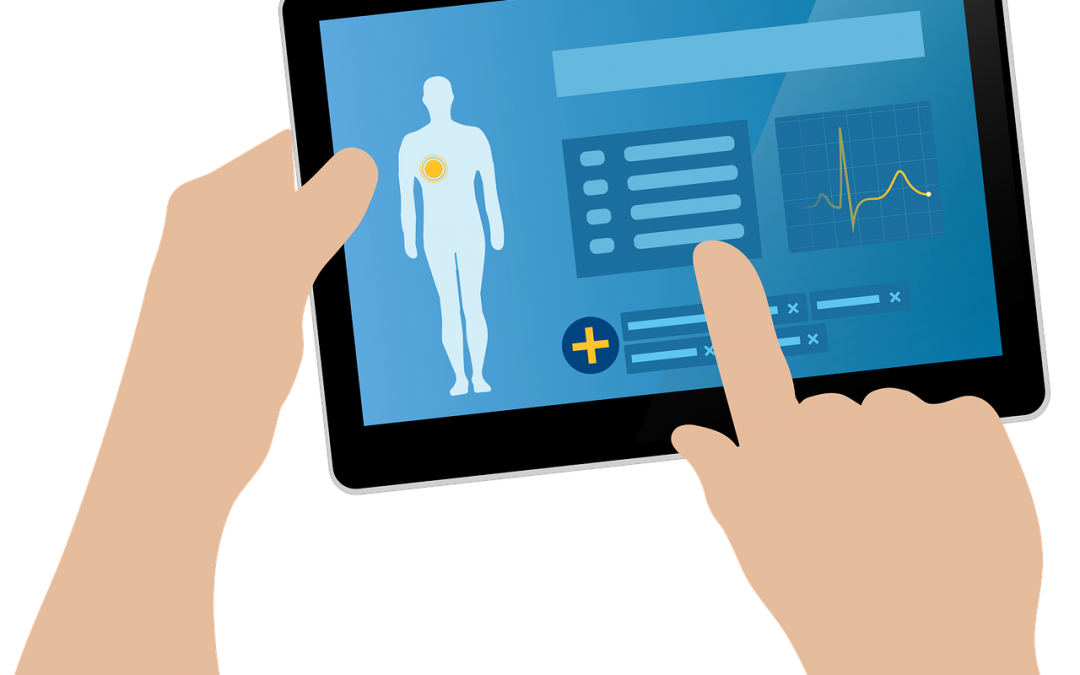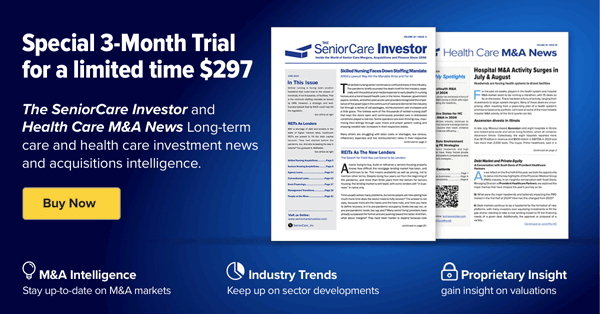Consistent annual growth in deal volume has characterized the remote patient monitoring (RPM) market in recent years.
Projections throughout much of the rest of the decade support the possibility that the trend will continue.
According to MarketsandMarkets, the size of the global RPM market in terms of revenue was estimated to be worth $71.9 billion in 2023 and is poised to reach $207.5 billion by 2028, growing at a compound annual growth rate of 23.6 percent from 2023 to 2028.
RPM allows patients to be monitored for specific health conditions and can prevent complications for those who can’t easily travel, according to telehealth.hhs.gov.
Symptoms and conditions that can be tracked through RPM include high blood pressure, diabetes, weight loss or gain, heart conditions, chronic obstructive pulmonary disease, sleep apnea and asthma.
Patients can use weight scales, pulse oximeters, blood glucose meters, and blood pressure monitors. Other conditions demand more complicated devices requiring patient training, including apnea monitors, heart monitors, specialized monitors for dementia and Parkinson’s disease, breathing apparatuses, and fetal monitors.
“A significant number of new entrants to the market have been able to drive adoption of remote monitoring programs, creating a number of new targets for potential deals,” said Caroline Reignley, a partner in McDermott Will & Emery’s health care practice. “The market is currently fragmented and remote monitoring programs can focus on a wide variety of diagnoses and disease states. The broad variety of companies operating in this space and the rapid growth of many of these companies have driven the increase in deal volume. I would expect this growth to continue for several years until the market matures and stabilizes.”
Higher Totals
According to the LevinPro HC database, 14 RPM deals took place in 2020. The number reached 15, 16 and 22 in the next three years.
The most significant deals that have occurred in the last four years include:
- LAMF Global Ventures Corp. acquired Nuvo Group on Aug. 18, 2023, for $269 million. Nuvo developed INVU by Nuvo, a remote pregnancy monitoring platform that enables the delivery of remote non-stress tests and maternal and fetal heart rate monitoring.
- Advocate Aurora Enterprises purchased Clear Arch Health and MobileHelp for $290.7 million on April 4, 2022. MobileHelp uses GPS tracking to pinpoint a patient’s location, allowing emergency personnel to find them faster. The device can also detect falls. Clear Arch operates software that integrates with electronic health records and allows physicians to create customized care plans for patients with chronic diseases and monitor them remotely. Advocate Aurora Enterprises is a subsidiary of Advocate Aurora Health, a not-for-profit health system. Acquiring MobileHelp gives Advocate Aurora Enterprises access to Clear Arch Health, MobileHelp’s sister company that it spun off into a separate entity.
- Current Health, a care-at-home technology platform based in Edinburgh, Scotland, was acquired by retail giant Best Buy Co., Inc. on Oct. 12, 2021, for $400 million. The company’s platform combines RPM, telehealth and patient engagement services.
- NantHealth, Inc. sold its Connected Care assets, which provide medical device interoperability to hospitals and health systems, to Masimo Corporation on Jan. 14, 2020, for $47.25 million.
“There are a variety of new medical devices [including software as a medical device or SaMD] that have come to market,” Reignley said. “Some of these devices have been able to take advantage of the remote physiological and remote therapeutic monitoring codes. In addition, RPM companies are increasingly integrating with or directly using providers’ existing EHR systems, improving both the operations and outcomes for remote monitoring programs.
‘Improved Outcomes and Reduced Costs’
Remote monitoring programs can be operationally complex to establish and integrate for health care providers. Many providers who furnish remote monitoring services rely on vendors to assist with software integration, obtaining devices and clinical staffing support. While the availability of reimbursement under Medicare and other payors has created an incentive to provide the services to patients, and there is a clear potential for improved health outcomes and reduced overall healthcare costs, reimbursement rates for the services may not fully capture all of the costs involved in establishing robust and effective remote monitoring programs.”
RPM deal totals recorded so far this year indicate that the pace of deal activity in 2024 might slow.
There have been eight RPM deals recorded so far this year. None of those transactions contained prices that have been revealed.
“The remote patient monitoring sector should remain strong as providers see the clinical benefit of these services and the value in monitoring patients either with chronic conditions or post-hospitalization,” said Deborah Godes, a vice president at McDermott+Consulting. “However, I do not expect that the trajectory that we have seen over the last few years will continue. I expect the growth to taper off as post-[public health emergency] requirements are implemented and as potentially more payers begin to establish coverage policies [limiting the eligible patient population, the length of time or other characteristics], given the significant growth in utilization.
“I do not necessarily see firms looking to the RPM companies to boost their bottom lines, but rather to round out their portfolio of services that they provide in order to create potential patient stickiness.”
Big Decline Across eHealth
Patient Engagement is another eHealth subsector that is looking for a recovery in deal totals after a sharp drop in recent years.
According to healthaffairs.org, it is a concept that combines patient activation with interventions designed to increase activation and promote positive patient behavior, such as obtaining preventive care or exercising regularly.
Transactions increased from 49 to 52 in 2020 and 2021. The amount fell to 43 in 2022 and plummeted to 17 last year. The total in 2024 is 10 deals.
Notable transactions in the subsector in recent years include:
- Twill, formerly known as Happify Health, is a global software-enabled healthcare platform that provides digital therapeutics and care delivery models focusing on mental and physical health, was acquired by DarioHealth Corp. on Feb. 21, 2024, for $10 million.
- HealthComp Holding Company LLC, a New Mountain Capital company and an independent health plan administrator for self-funded employer groups, purchased Virgin Pulse, which was backed by private equity firm Marlin Equity Partners, on Sept. 27, 2023, for $3 billion.
- VitaCare Prescription Services, a technology and services platform that helps patients navigate access and adherence barriers for brand medications, was acquired by GoodRx Inc., which is an online platform that allows users to compare prescription prices and information across retailers to find the most affordable option. The March 7, 2022, deal was for $150 million.
- Falcon Capital Acquisition Corp., a special purpose acquisition company, acquired Sharecare, Inc., which provides an online health and wellness engagement platform, for $3.9 billion on Feb. 12, 2021.
- Intrado Corporation, a portfolio company of funds managed by Apollo Global Management, Inc., sold Health Advocate, a consumer-focused health platform for the employer market, to Teleperformance. The $690 million deal was announced on Oct. 27, 2020.
The Point of Care Support subsector has experienced an almost complete disappearance of deal activity. Transaction totals dropped from nine in 2022 to three last year. Only one transaction has been reported in 2024. The numbers were four and one in 2020 and 2021, respectively.
The 2021 deal came on Dec. 27 when My Health Logic Inc., a subsidiary of Health Logic Interactive Inc., was acquired by Marizyme, Inc., an integrated life sciences company dedicated to the acquisition, development and commercialization of therapies, devices and related products that maintain cellular viability. The sale price was $8.73 million.
Rio de Janeiro-based PEBMED was acquired on July 21, 2020, for $26,104,377 by Afya Limited of Nova Lima, Brazil.
Care Coordination is another vertical that may not exceed double digits this year when it comes to transactions.
It is defined as the organization of treatment across several healthcare providers, according to HealthCare.gov.
Only two deals have been reported so far in 2024. The totals were five and eight in 2022 and 2023, respectively. There were 19 transactions posted in 2021 and nine in 2020.
Reported sale prices have declined over time, with significant deals in recent years that include:
- Thirty Madison, Inc. purchased The Pill Club, which is an online birth control and women’s health company, on June 14, 2023, for $32.3 million.
- PatientPing was purchased by Appriss Health, which provides state government agencies with substance dispensing information, for $500 million on March 23, 2021.
- Cerner Corporation sold parts of its IT Healthcare portfolio to CompuGroup Medical AG, which develops software products to support all medical and organizational activities in doctors’ offices, pharmacies, labs and hospitals, for $247.5 million on Feb. 5, 2020. The deal expanded CompuGroup Medical’s presence in Germany and Spain.


